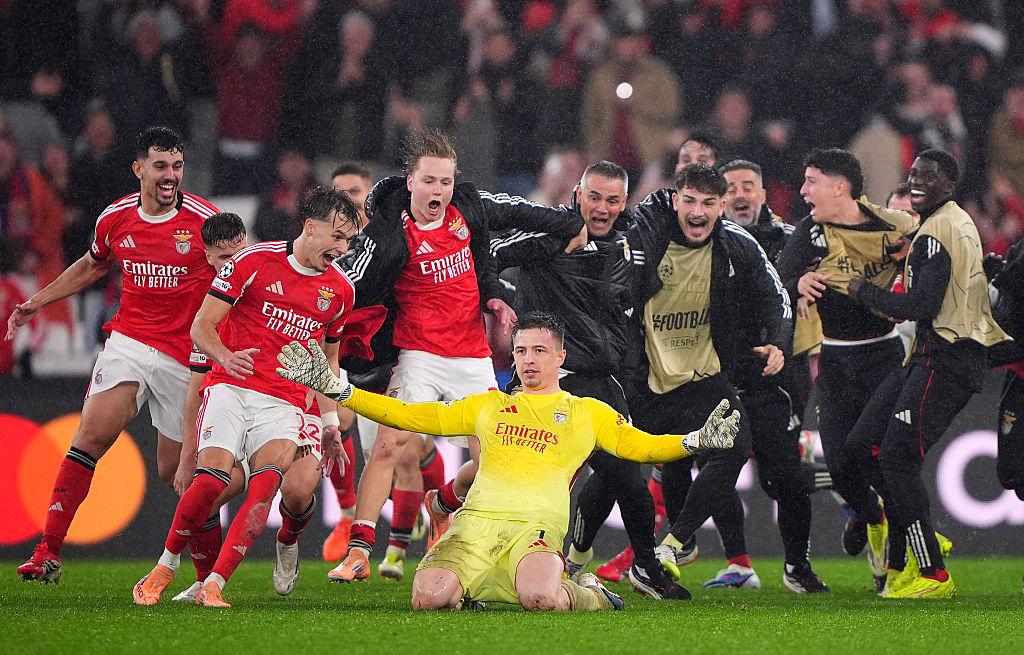Whatever happened to goalmouth scrambles? FourFourTwo investigates a lost phenomenon
Better pitches? Cowardly players? Who's to blame for the disappearance of penalty-box pile-ups? Nick Moore tried to find out...
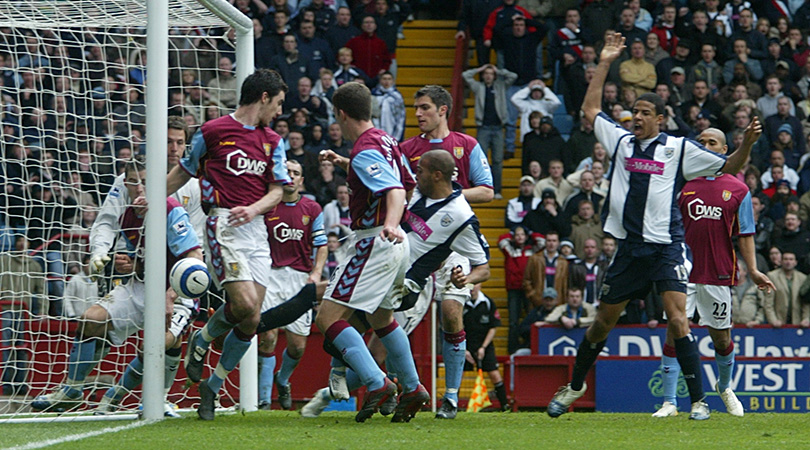
Men smoking pipes. White dog poo. Leaving huge piles of cash, jewellery and heirlooms unattended on your doorstep and them not being seized by dark web sex gangs. These all are things hopeless nostalgists wonder why you never see any more.
And to that list we must sadly add the goalmouth scramble.
To the addled brain that recalls pre-Premier League football through a rose-tinted lens, picturing a day when men were men and shinpads were for conscientious objectors, there was a proper slab of six-yard box warfare every single week. There was nothing more British than 20 moustachioed sadists, all called either Glenn or Alan, thrashing violent approximations of a kick at an elusive Mitre Delta.
It was a welcome break from the real game, like a dog on the pitch. Smokers on the terraces would yell “ONE OF YOU!” in despair. Bodies would pile up like a vile orgy. Somebody would lose an eye, and eventually a totally exhausted Alan would lump it clear, or a sweaty Glenn would deflect it into the net and wheel away, laughing at the madness of it all.
Bodies would pile up like a vile orgy. Somebody would lose an eye, and eventually a totally exhausted Alan would lump it clear, or a sweaty Glenn would deflect it into the net and wheel away, laughing at the madness of it all
So why doesn’t it happen any more? Why doesn’t Virgil van Dijk end up falling on his backside after Olivier Giroud and Theo Walcott have hammered 17 shots off his shins? Why oh why are Joe Hart’s testes still in tact? FourFourTwo decided to investigate – and even if we don’t get to the bottom of it, at least we’ll get to watch six hours of scrambles on YouTube: something we recommend you do as soon as you have finishing reading our findings.
Don't make 'em like they used to
Our first suspect is the modern, pampered player. Some will allege that our carefully-coiffed generation are all too lily-livered to stick their shins where it hurts.
The best features, fun and footballing quizzes, straight to your inbox every week.
In contrast, witness history’s greatest goalmouth scramble, in which a fearless defence came out on top against a bunch of bruisers: Norwich City vs Wimbledon, September 11, 1993. Here, the Canaries’ goalkeeper Bryan Gunn was right in the thick of it. The entire Crazy Gang, including John ‘Fash the Bash’ Fashanu, ended up on top of him in a ding-dong more reminiscent of a rugby ruck.
As the players are eventually peeled off, the granite Scot emerges with the ball. It’s a snapshot far removed from the current game.
“It was a corner that turned into something straight out of a Benny Hill sketch, with everyone chasing each other,” Gunn tells FFT. “The ball ricocheted everywhere before I pounced on it. Then the whole mad lot of them just decided to pile on top of me. Those are the sort of moments when the madness of being a keeper really hits home. Thankfully, I was unscathed and still had a big smile on my face. But it shows how committed players were.
“Everyone’s eyes were focused on the ball. Defenders are putting their bodies on the line. Hands and heads were thrown in, and boots were flying.”
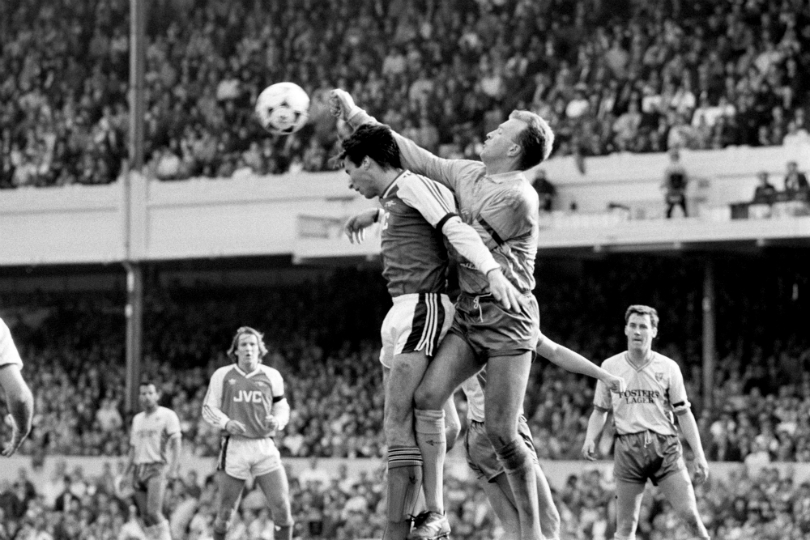
Yet Gunn – whose son Angus is a professional keeper with Manchester City – doesn’t believe that the courage level of participants has changed. “Angus would jump into that situation, if that’s what it took,” he says. “In fact, I think Vinnie Jones might even be a bit wary of jumping on top of him because he’s 6ft 6in – much more intimidating than me!
“So I don’t buy into the whole idea that players are less brave. There may be fewer messy situations now due to the tactics. The game has advanced and we’ve got things such as zonal marking. When the ball comes in, you clear from your area. You might not even be standing beside a man, you’re just marking some space. It’s less physical, and that must be a factor.”
The end of long-ball play, and the abolition of the back-pass rule, have contributed as well.
Gunn adds that, for a goalkeeper, a pinball situation is a total lottery. “Repositioning yourself in that scenario is pure luck. You’ve made that first movement and have shifted your body weight. All technique is out of the window and you just do what you can to avert the danger.”
Gunn also mentions the way the sport is officiated in the present age might have contributed to the death of the six-yard box melee. Always happy to blame the referee, we decided to give a notorious whistleblower a bell – and he’s willing to play along.
“The game has totally changed from the days of chaos in the area,” says former Premier League ref Jeff Winter, author of Who’s The B*stard In The Black.
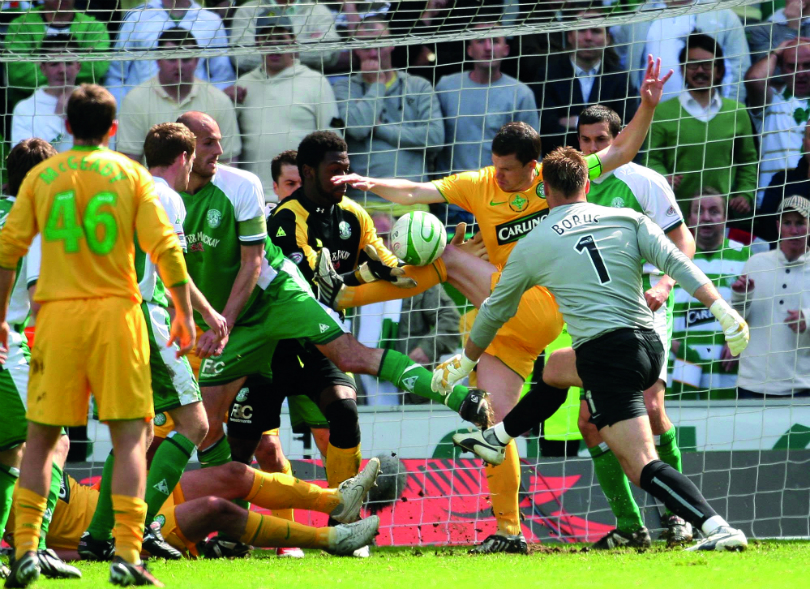
“Referees stop the action quicker than they used to, and they will penalise any sort of contact in the box as a form of prevention.
“You could argue that it's good management to snuff out the mayhem before it happens, because present-day footballers are not prepared to take it. They're rolling around on the floor when you get that kind of close proximity.
“So the referee might now blow up and pre-empt a situation, thinking that it’s better safe than sorry. If they get to the point where there are arms and legs flying all over the place, they think, ‘oh shit, I’ve left this too late’. The whistle will go before a scramble can happen.”
Winter also points out other situations where pros are no longer willing to subject themselves to potential maiming. “You can see the difference from the old days when you would get a drop ball. Back then, you’d have two combative midfielders, and getting the ball would be the last concern for them. Now, in that situation, it gets punted back to the opposition.”
A change for good
And he believes that while we no longer get amusing Gunn-style playground pile-ups any more, it’s probably for the best.
“You don’t have the Norman Hunter-type defender these days. Skilful players were kicked from pillar to post, and you had the likes of Marco van Basten being put out of the game by some terrible tackles. So yes, it can be a bit more sanitised in the box, but you haven’t got people being kicked up in the air and you don’t think, ‘stop playing like silly buggers and get on with the game’.
“Referees using common sense has made the game less physical. Instead we’ve got more subtle, cynical stuff like pulling shirts – but that’s better than careers being ended.”
Whistle-happiness has therefore reduced the opportunities to witness goalmouth scrambles. And yet there are examples which are clearly not filled with malicious intent: they’re far more Keystone Cops than A Clockwork Orange. Which brings us neatly on to perhaps the stupidest goal of all time.
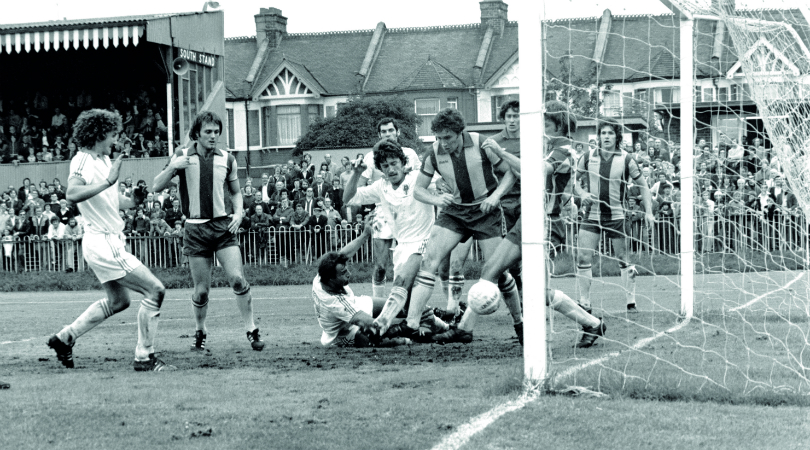
“Everywhere you looked, there was an Adidas in your face”
Paul Lake is best known for a stellar but all too brief playing career and the brilliant, brave biography, I’m Not Really Here, that he wrote about his mental struggles dealing with life after forced retirement. But he should also be celebrated for adding the finishing touch to the untidiest strike in history – a late FA Cup leveller for Manchester City at Blackpool on January 30, 1988.
This is the Mona Lisa of melees, the Sistine Chapel of scrambles, the Breaking Bad of penalty box barminess. In a way, his goal is as breathtaking as Maradona’s 1986 individual run and finish against England or Brazil’s mathematical dissection of Italy to finish off the 1970 World Cup Final, with Pele’s nonchalant assist for Carlos Alberto.
This is the Mona Lisa of melees, the Sistine Chapel of scrambles, the Breaking Bad of penalty box barminess
After the football is thumped emphatically into the mixer by Andy Hinchcliffe, at times it’s impossible to know exactly what is going on. Ranks of tangerine defenders dig away like they’re in the trenches of the Somme. Somebody falls to the floor at least every second. The ball periodically appears for air, only to receive another severe hiding. Finally, mercifully, Lake puts it out of its misery, over the line and into the Bloomfield Road net. The City supporters go absolutely crackers.
Re-watching on YouTube, Lake can’t help but laugh. “It’s lovely to see it again,” he explains to FFT. “You’re a long time not playing so it is wistful, but it brings back all of those emotions. I remember it well. I was a goal-a-season man, so to just have an opportunity was great. It was comical, like the ball was on a piece of string. Backwards and forwards, in and out, you could barely move. Everywhere you looked, there was a pair of Adidas boots.
“I was loitering around the penalty spot. It fell to me on something like the seventh ricochet, and even my final touch took at least one deflection. I didn’t know how to celebrate. It was the scrappiest goal ever but my abiding memory, aside from 19 players in the penalty box, was the response of the fans. They loved it. It was unbridled joy.”
He had to fight for recognition, however. “Back in the ’80s there were no names on the backs of the shirts, and after the match Paul Stewart tried to claim the goal,” reveals Lake. “He wanted it on his CV! He was looking for a move away, and not long after he went to Tottenham. Paul was laughing, because he knew that it was my goal. I told him there was no way I was letting that one go. I don’t care how bad the goal was, it was mine.”
Back in the ’80s there were no names on the backs of the shirts, and after the match Paul Stewart tried to claim the goal. He wanted it on his CV!
Lake doesn’t believe refereeing is key to the fact that we don’t see this carnage any more, however. “It’s the quality of the surfaces and the tactics,” he says. “You don’t see mud now, but back then some clubs wanted to play on a poor pitch because it would cancel the skill factor. And you’d normally have a big targetman to fire balls up to.
“It was fun, really. I loved a muddy old kickabout. It takes you back to playing in the park. Games weren’t called off then – you’d need an earthquake or monsoon. You’d play on concrete ice or in a bog, but the expectations have changed now. The pitches are great, and the slower build-up play means you have far less six-yard box action.”
“It used to be one man with a gammy leg cutting the grass”
Should we, then, just blame the men with forks for ruining all of our fun? Leicester City’s much-acclaimed groundsman, John Ledwidge, thinks so.
“Pitches have changed massively and we’ve ironed out the inconsistencies,” he tells us. “Back in the day, it was literally one man with a gammy leg cutting the grass, even at the highest level. I was at Coventry, and we’d be tapping divots before flattening out the surface using a 1.5 ton roller.
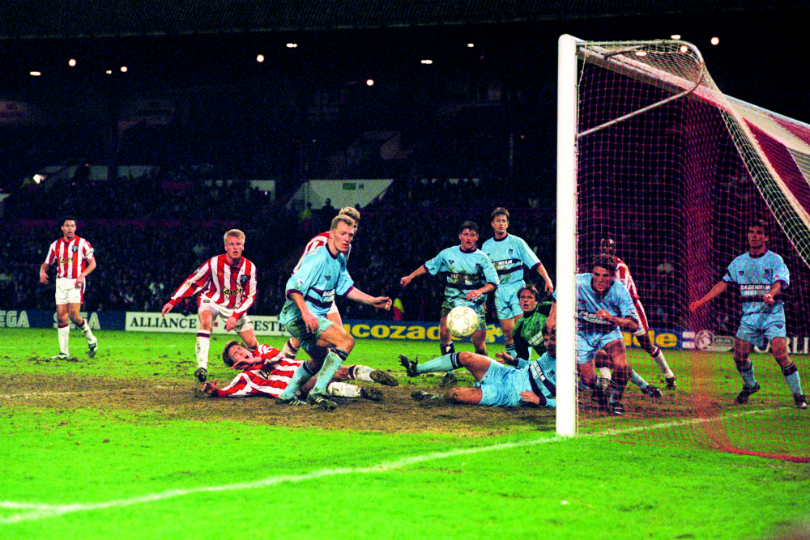
“Some clubs would even use the surface as a tactic. One manager that I heard about used to invite the youth team down to wreck the pitch on a Friday night, and he would then tell the groundsman not to touch it afterwards. It was an absolute horror show for the ground staff because it looked really shit – but they knew that the top teams wouldn’t like to go and play on it.
“Today, there’s so much technology involved in the job. The biggest development was the introduction of sand-based pitches. They used to be indigenous soil, with a bit of seeded topsoil. That would be able to hold the water and you’d get a bog. The ball would go everywhere.
“Now we mainly have sand pitches along with a full drainage system, plus Desso GrassMaster – a synthetic fibre which helps to keep a pitch stable even if you lost the grass. In addition, the bigger clubs will have huge lighting systems, which allows you to replicate sunlight and then grow great grass all year round.”
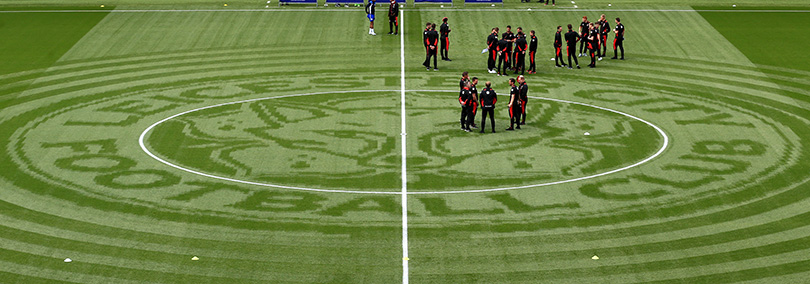
All this is a necessity given the money at stake, believes Ledwidge.
“Players are expecting the pitch to look the same in December as it does in August. If we lost a game due to waterlogging, heads would roll. A pitch is a contributing factor to how a team plays now. You’ve got £400 million running around on your asset, so you’re accountable. The days of a ball bobbling over Tim Flowers’ head are long gone.”
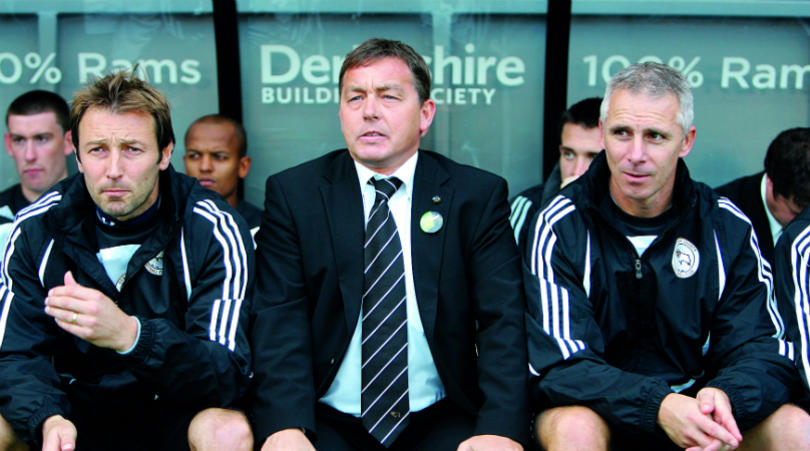
Slick surfaces, scared refs, skilful players and sophisticated tactics, it seems, have combined to scupper the goalmouth scramble.
They seem a thing of the past, although they aren’t really of course. Drop down the tiers and your box battle ratio suddenly rockets up. Get to non-league level, meanwhile, and you're virtually guaranteed one every week, like an ’80s revival.
Who knows – you might even get to see some white dog poo and a fella with a pipe while you’re there.
This feature originally appeared in the September 2017 issue of FourFourTwo. Subscribe!
Nick Moore is a freelance journalist based on the Isle of Skye, Scotland. He wrote his first FourFourTwo feature in 2001 about Gerard Houllier's cup-treble-winning Liverpool side, and has continued to ink his witty words for the mag ever since. Nick has produced FFT's 'Ask A Silly Question' interview for 16 years, once getting Peter Crouch to confess that he dreams about being a dwarf.
 Join The Club
Join The Club






